 When Not To Be on a Ketogenic Diet
When Not To Be on a Ketogenic Diet
A ketogenic diet is a very low carbohydrate, moderate protein, and high fat based nutrition plan. A ketogenic diet trains the individual’s metabolism to run off of fatty acids or ketone bodies. This is called fat adapted or keto adapted, when the body has adapted to run off of fatty acids/ketones at rest.
This nutrition plan has been shown to improve insulin sensitivity and reduce inflammation. It also improves cellular healing and mitochondrial biogenesis which supports stronger and healthier cells. All of this leads to reduced risk of chronic disease as well as improved muscle development and fat metabolism (1, 2).
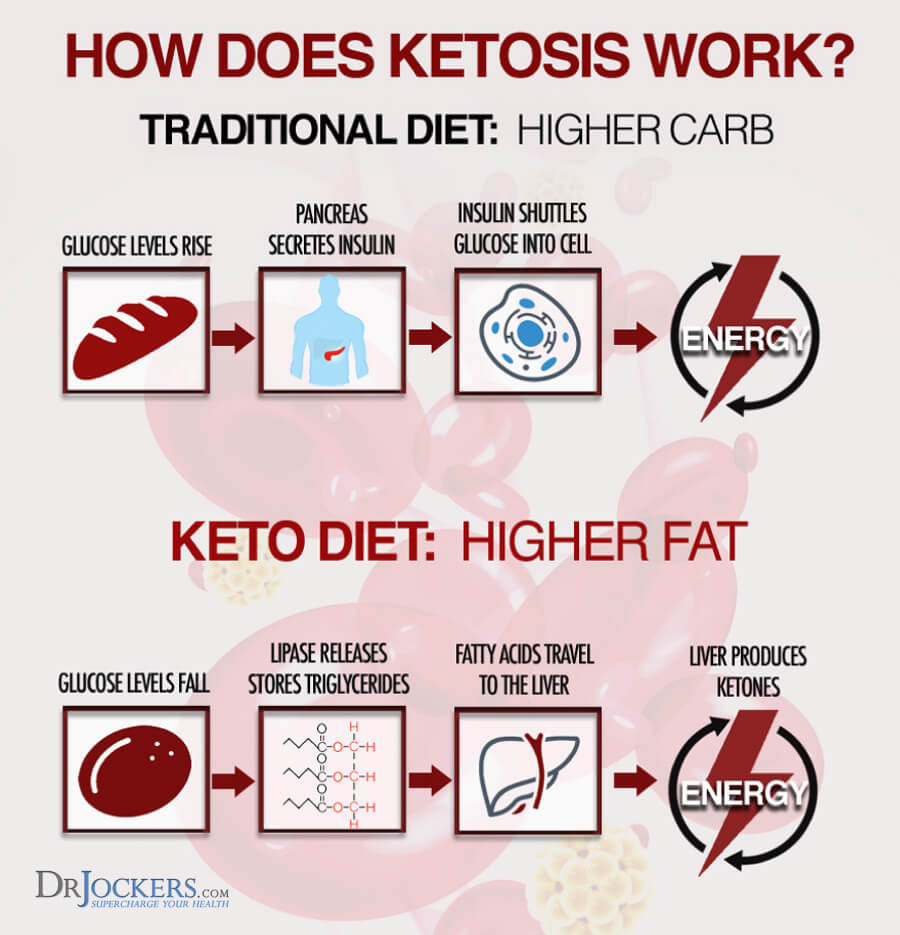
Where Ketosis Can Be Extremely Beneficial
There are certain cases, where I typically recommend a ketogenic diet as the research appears to support that ketosis significantly improves the functionality of these individuals.
Overweight or Obese
Neurodegenerative Conditions such as dementia, Alzheimer’s and Parkinson’s
Most Cancers but especially those of the brain, nervous system, and blood (leukemia)
Chronic Pain
Seizure Disorders
Non-elite athletes or individuals looking for higher mental & physical performance
The final one is the area that I and many others who have pursued a state of ketosis fall into. At this point in my life, I have no chronic diseases, I feel great 99% of the time, but I am always looking to improve my productivity and performance. I have found being in mild ketosis to be one of the best ways to improve my energy, mental acuity, creativity, physical strength, and overall life performance.
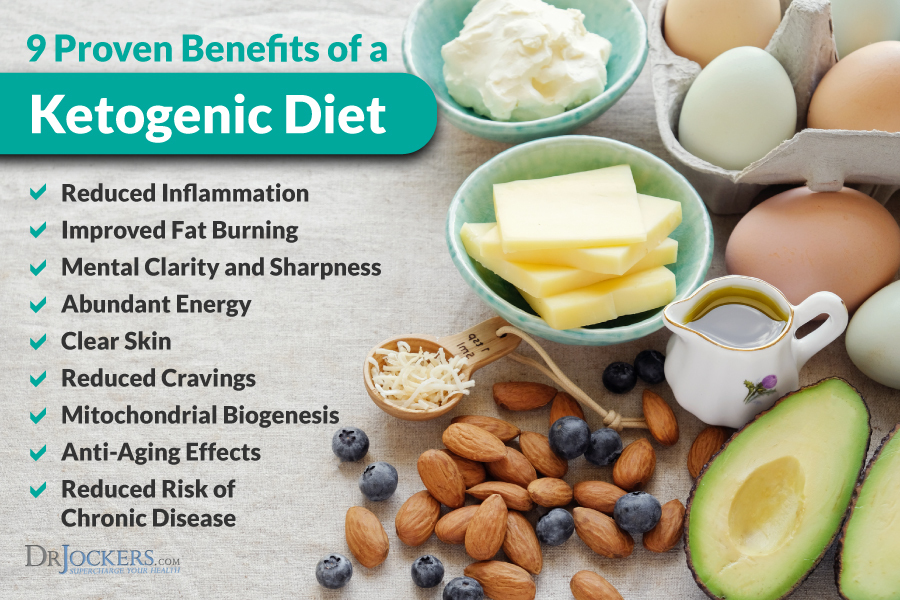
When Ketosis Shouldn’t Be the Desired State
There is no one diet that works perfectly for everyone. Ketosis has the potential to benefit everyone, but under unique circumstances, it would not be warranted.
Here is a list of special cases where long-term stable ketosis is not appropriate. In some of these cases, short term, mild ketosis can be very beneficial but it is on a case-by-case basis.
Pregnancy and Breast Feeding
Children and Teenagers
Irregular Menstrual Cycles
Adrenal Fatigue
Poor Thyroid Function
High Level Athletes
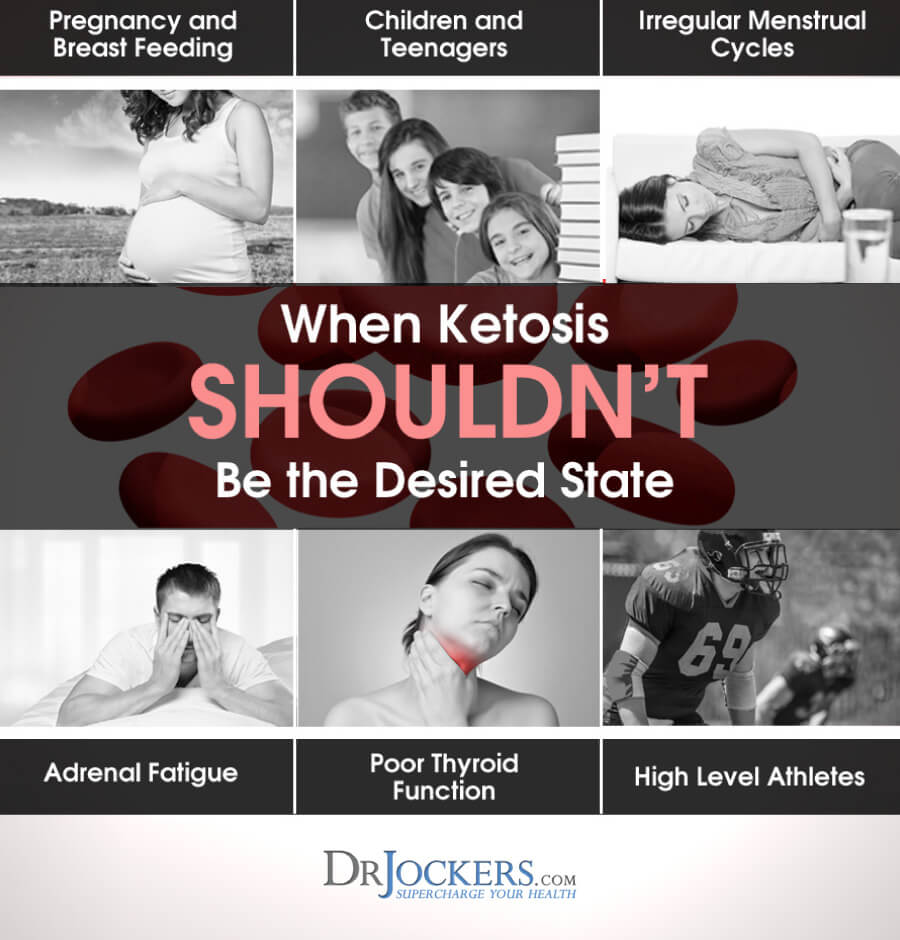
Insulin, Leptin, and Female Hormones
Carbohydrates play a role in stimulating the release of insulin and insulin works with a hormone called leptin to help govern energy metabolism (3). Leptin is released from fat cells as they enlarge during a meal and its main function is to signal to a part of our brain called the hypothalamus that we are satisfied and no longer need food.
Insulin is known to stimulate leptin synthesis. A ketogenic diet significantly lowers insulin, which also lowers leptin levels (4). Leptin receptors are found in the human ovaries and pre-ovulatory follicles. Lower levels of circulating leptin can negatively affect the reproductive tissue and cause imbalances in key sex hormones in the female body (5).
Low leptin levels send a message to the body that it is in a time of famine, which can cause a stress response. In these cases, reproductive functions are not prioritized (because the body doesn’t believe the environment is conducive to bringing about life).
This is especially true for women who are already lean and are sticking with a strict ketogenic diet. Women, who naturally have higher body fat levels, will have slightly higher leptin levels while women who are very lean will naturally have lower leptin levels.
Science and research tell us that leptin is needed to maintain female hormone levels in their proper range (6). These hormones are critical for menstruation, fertility, lactation, and reproduction. If we lose leptin sensitivity from a higher carb, inflammatory diet or if our leptin levels drop too low from prolonged ketosis, it can spell hormonal problems for women.
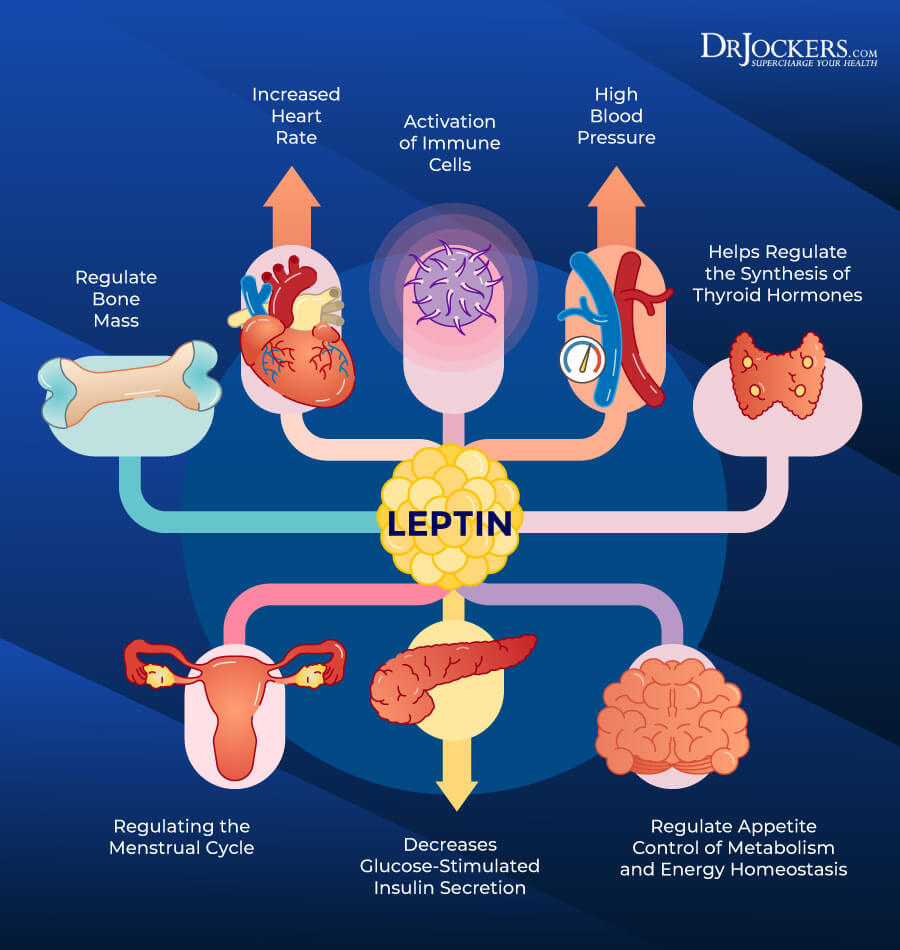
Pregnancy and Breast Feeding
As babies are developing in the mother’s womb it is critical that the body doesn’t experience any sort of threat of food scarcity. During this stage, it is not appropriate to practice lengthy periods of intermittent fasting or attempt to be on a ketogenic diet.
My wife is currently pregnant with twin boys as I am writing this and she consumes roughly 60-80 grams of carbohydrates on a typical basis. So it is still a lower carb diet but not the 50 grams or less that is necessary to be in mild ketosis.
The best sources of carbohydrates are those that are packed full of antioxidants. I suggest extra berries, yams, sweet potatoes, pumpkin, carrots and beets.
Children and Teenagers
Children are growing and developing so rapidly and major bodily stressors can negatively effect this. Being in a long-term state of ketosis was shown to help reduce seizures in teenagers with epilepsy but 45% of the girls reported menstrual irregularities such as amenorrhea (no menstrual cycle) and delayed puberty (7).
The only time I recommend a full-ketogenic diet is when children have either epilepsy or another seizure based disorder or if they have cancer. Other than that, I encourage parents to give their kids some low-glycemic fruit in the form of berries, granny smith apples, kiwi, grapefruit, etc. as well as root vegetables such as sweet potatoes, pumpkin, carrots and beets.
Irregular Menstrual Cycles
If you are noticing irregular menstrual cycles on a ketogenic diet, than I would consider bumping up your carbs into that 60-80 range and see what happens.
This is especially important if you are doing a lot of high intensity exercise. The combination of low-carb and high intensity exercise in a lean woman can be a set-up for disaster. Doing this can put the body into a chronically stressed mode and wear out the adrenal glands causing poor exercise recovery and fatigue as well as premenstrual symptoms (8).
Adrenal Fatigue
The adrenal glands are designed to help the body adapt to stressors. They allow us to think sharply, run and jump and make quick decisions. To do this, they play an important role in regulating blood sugar levels in order to make sure we have the sugar in our system for quick and immediate energy. Adrenal fatigue takes place when the body is under chronic stressors the adrenal glands can no longer keep up with the demands (9).
Lean women who are under stress, do high intensity training and are on a ketogenic diet may be creating a state of chronic stress that there system is unable to adapt too. Cycling out of ketosis, reducing your training load and improving rest along with using things like adaptogenic herbs and B vitamins can help you to recover effectively.
Most men can recover from adrenal fatigue much faster than women, because they have a different hormonal system that is easier to get under control. However, if you are a man dealing with adrenal fatigue, it would be a good idea to cycle out of ketosis, get some good rest and using adaptogenic herbs to speed up recovery would be advised before going back into ketosis.
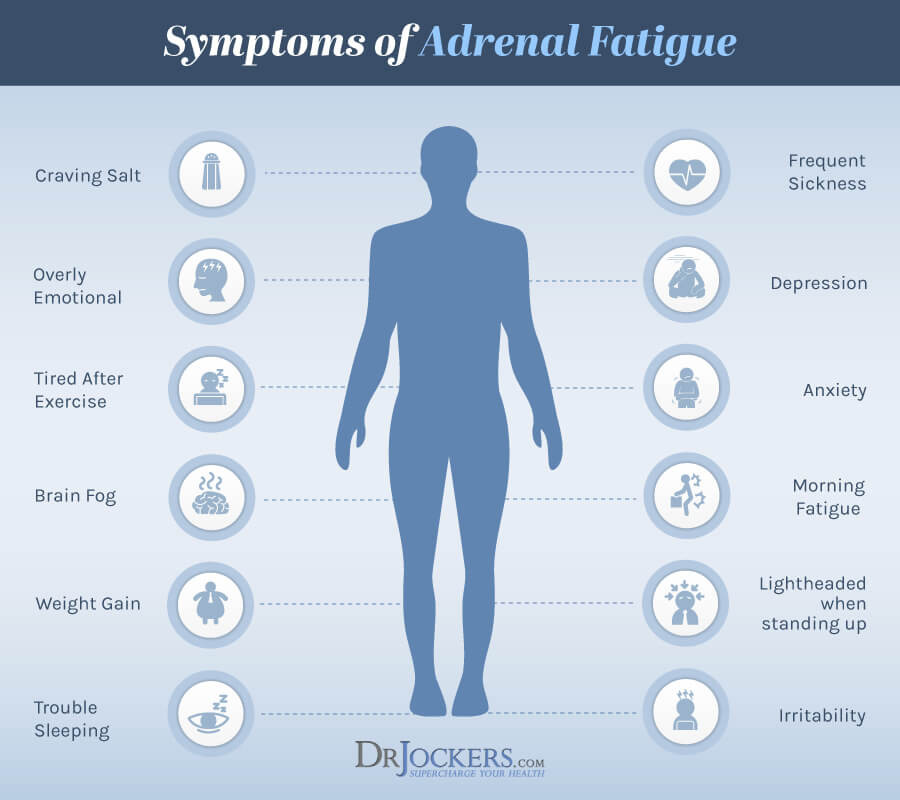
Poor Thyroid Function
The thyroid helps to regulate metabolism and energy levels throughout the body. If you are in adrenal fatigue, it is a natural mechanism for the body to down-regulate thyroid function. One way the body does this is by increasing reverse T3 (rT3) which is an inactive form that competes with active T3 for cell receptor activity (10).
The body does this as an intelligent response because it is trying to conserve resources and put us in a state of hibernation so we can rest and recover effectively. If the body allowed the thyroid to continue to function at a high level while we were already experiencing adrenal fatigue, it would drive us into a deeper stage of adrenal fatigue that could be life threatening.
It is important to note that many people with hypothyroidism do very well with a cyclic ketogenic diet, but if adrenal fatigue is the major mechanism, than it can be harmful. Take time to support the adrenal glands and then try going back into ketosis. I discuss how to do the ketogenic properly for individuals with thyroid issues in this article.
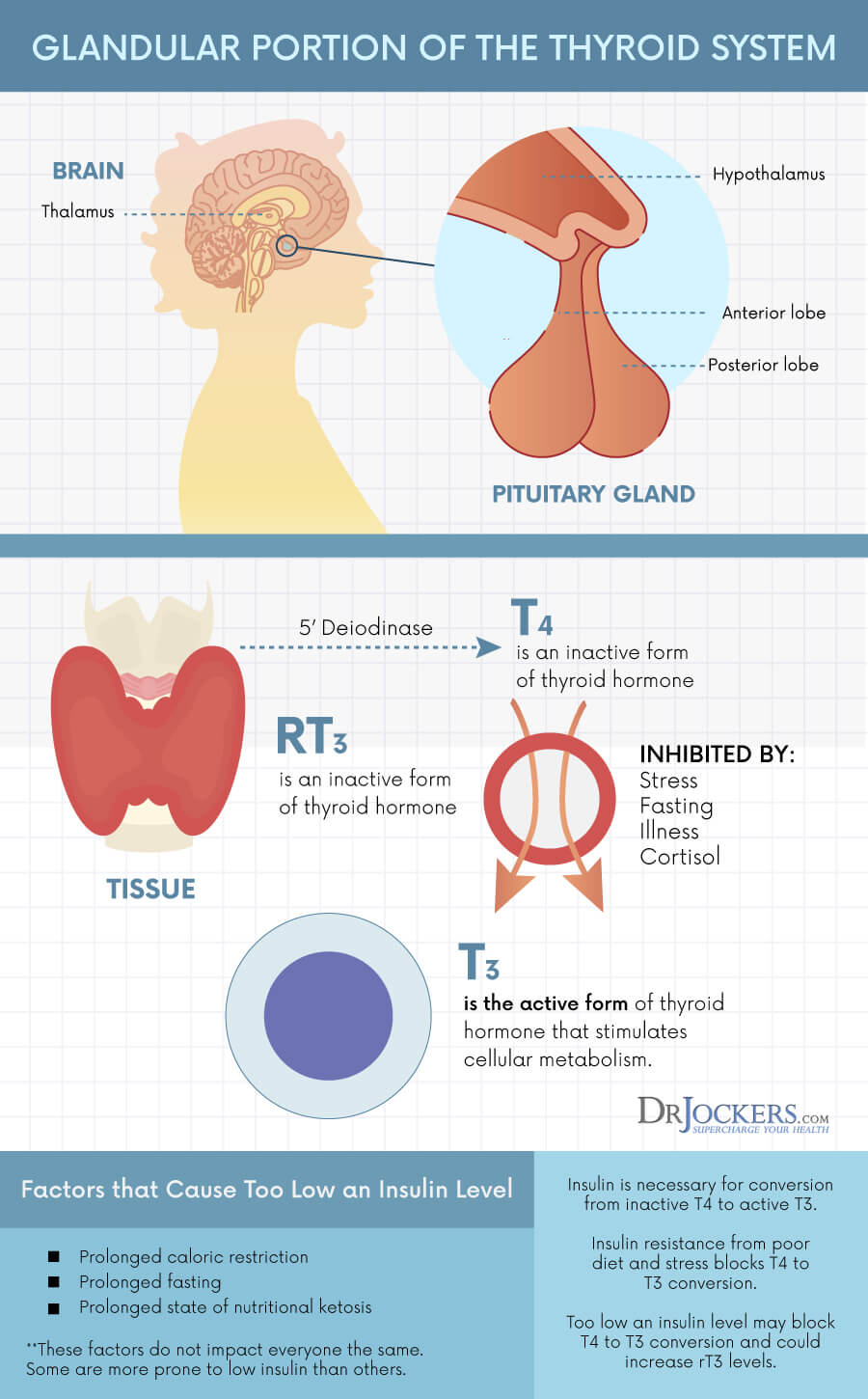
High Level Athletes
If you are a high level athlete that is competing in Cross-Fit, triathlons, iron-man, long-distance runs, soccer, basketball and football then the ketogenic diet may be challenging. When you are working your body at an extremely high level of activity, you need more calories and quick fuel that is immediately available in your muscle and liver.
A ketogenic diet for a high level athlete can be incredible but it is much tougher to follow and the risk of adrenal insult is higher than someone who is doing a smaller load of exercise.
Cyclic Ketosis and Carb-Back Loading
The best way to add back carbs is to boost them up in the evening. The reason for this is that keeping your carbs low throughout the day is the best way to keep your blood sugar stable and prevent cravings. Once you begin eating carbs during the day, you will notice a much greater degree of hunger throughout the day.
Additionally, we naturally have higher cortisol in the morning and cortisol helps to increase blood sugar. At night, cortisol should naturally drop while melatonin rises so we can sleep well. If our blood sugar is too low and we don’t have enough stored sugar (glycogen) in our muscles and then our body may perceive a time of famine and drive up stress hormones and blood sugar.
Taking in carbs in the evening helps to keep stress hormones down and also provides sugar to refuel the muscle and liver glycogen stores. This is called carb backloading and you can read more about it here. When the body has full glycogen stores, it is much less likely to perceive a time of famine.
Once your adrenals are reset, you only want to add back carbs on evenings where you did some sort of exercise. The exercise will pull glycogen out of the muscles and liver and we want to replace that so the body doesn’t get worries about the lack of glycogen. On rest days, go low-carb as your stored carbohydrate in your muscle and liver are still full, so your body won’t perceive this as a period of famine.
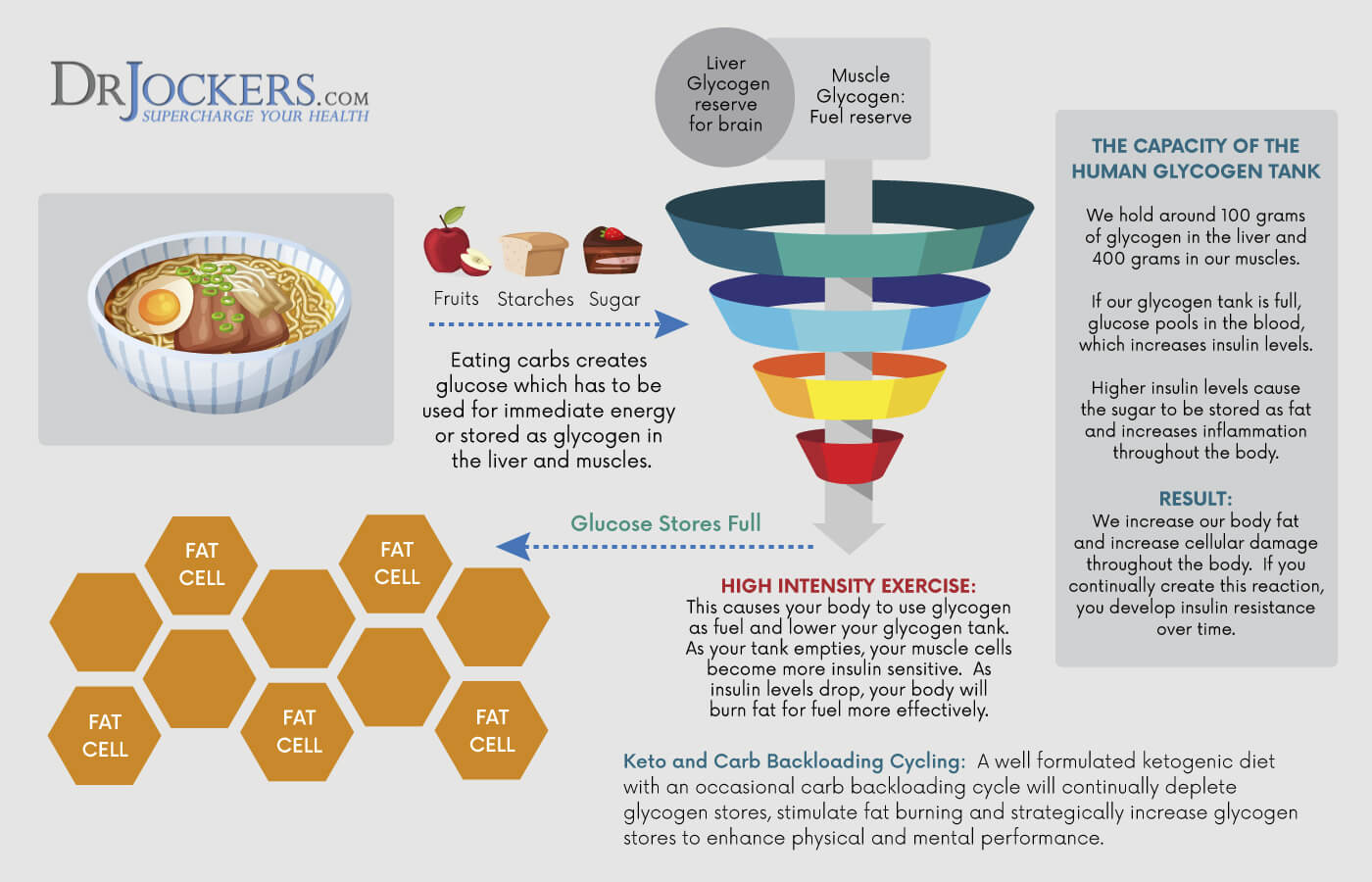
Dr Jockers Favorite Carbohydrate Sources
I personally will do 2-3 higher carb days (60-100 carbs max) each week on my higher training days. What is really cool is that after fasting for 14-16 hours the next day, I am typically back into mild-ketosis. This process allows me to do very high intensity training while keeping my adrenals and thyroid healthy.
My favorite carb sources include the following:
- Berries: By far the best because they are loaded with anti-oxidants and powerful DNA protecting nutrients such as anthocyanins (blueberries and blackberries) and ellagic acid (strawberries and raspberries).
- Beets: Great prebiotic fiber and loaded with B vitamins. The best food source of trimethylglycine (also called betaine) which is key for protecting our DNA. If beets didn’t have sugar in them, I would suggest we all eat them everyday!
- Carrots: Great prebiotic fiber and beta carotene. Carrots and beets are two of the very best foods for stimulating healthy peristaltic activity in the gut for good bowel movements.
- Sweet Potatoes: Great prebiotic fiber and loaded with beta carotene and tastes great.
- Pumpkin: Just like sweet potato, loaded with prebiotic fibers and beta carotene for a healthy body.
- Raw Honey: Raw honey has bee pollen and propolis within it that have profound immune system benefits. It also has over 100 active enzymes, bioavailable amino acids and B vitamins. If it didn’t have so much sugar, it would be one of my top health foods.
- Grade B Maple Syrup or Coconut Nectar: These are minimally processed sugars from the maple tree and the coconut tree. These natural sugars also have lots of B vitamins and enzymes to support the bodies energy levels.
- Quinoa: This is not technically a grain, but instead it is a starchy seed. Most people tolerate it well and it is loaded with complete protein, minerals and B vitamins.
- Unripe Bananas and Plantains: Green bananas and green plantains are unripe and there fibrous starch has yet to ripen into sugar. This form of starch is called “resistant starch” because the human digestive system cannot form calories from it. Meanwhile, our microbiome can break it down and use it as fuel. These do still contain some level of sugar and digestible carbs so they will increase your blood sugar but not as much as fully ripened bananas and plantains.
- Brown or White Rice: I am not a big fan of rice, but for an occasional carb feeding it can be a good source. While brown rice has significantly more nutrients than white rice, some people have problems with the lectins in the brown rice. White rice is known to be a great prebiotic fiber and dosn’t have the lectin load that brown rice has.
These are all sources that are most often well-tolerated. Grains and legumes are common food sensitivities that cause further adrenal stress on the body. If you feel as though you tolerate beans well, than by all means use those. If you have gas, bloating and inflammation when you consume them (or anything on this list) than I would recommend avoiding it.
Additionally, I would recommend using some of the blood sugar supportive elements in this article to reduce inflammatory spikes in blood sugar when you are carb loading.
If you want to work with a functional health coach, I recommend this article with tips on how to find a great coach. On our website, we offer long-distance functional health coaching programs. For further support with your health goals, just reach out—our fantastic coaches are here to support your journey.







I realize your article is about when not to be on a ketogenic diet but since you listed conditions for which a ketogenic diet is beneficial, I felt your readers should know that a ketogenic diet is most thoroughly documented in published studies to be beneficial for the treatment of diabetes. Since type 2 diabetes is a state of insulin resistance and carbohydrate intolerance, a ketogenic diet can actually place type 2 diabetes in remission permanently. I avoid using the term cure because the propensity for insulin resistance does not go away necessarily and thus resuming a high carb diet will result in the return of elevated blood glucose in many cases. However, a ketogenic diet as a permanent lifestyle change can result in normalization of blood glucose, avoidance of the longterm complications, reduction or elimination of diabetic medications including insulin which for such a simple and cost effective therapy is amazing! The same can be said for type 1 diabetes. A ketogenic diet results in near normal blood glucose with reduction in insulin doses and hypoglycemic episodes. For those interested in learning how to implement a ketogenic diet for diabetes, visit http://www.ketogenic-diet-resource.com. Best wishes for excellent health, Keith Runyan, MD.
Yes, very good info Dr Keith! Thanks for sharing that!
Agreed, much mis information I this article. It’s a risky great for adrenal fatigue and thyroid and most things that were listed it isn’t good for. Many of these people are healing all these with this diet. Time to just redo this article with actual information.
Ugh, typos. This diet is known to help the things like adrenal fatigue and thyroid. This article is misinformed and should be redone.
I agree with Christina,, thanks for sharing your point of view 😀
Hey guys, thanks for your input! This is not necessarily true and it can vary by individual. If someone has progressed into the later stages of adrenal fatigue their ability to become keto adapted is limited and can end up making things worse as it just ends up putting unneeded stress on the body. As of now this is the most accurate information based on research and my experience. I will update it with new information if my knowledge changes!
Blessings!
This is an excellent article, I am very grateful for the specifics here, such as the food list of better carbs to eat later in the day. Very helpful for me personally, confirms some of my own thoughts, and advice from my healthcare practitioners.
There is very little balanced information out there on this topic. Mostly extreme pro or anti keto voices, as if one size fits all. Thanks so much!
Thank you so much for the wonderful feedback Eileen!
Great information! I have no natural thyroid function due to radioactive iodine treatment of Graves Disease 25+years ago. My thyroid hormones are supplied by Nature-Throid (T4+T3). I’ve been successful at losing weight, though slowly, by sticking to a ketogenic diet for the past 3 months and I feel good. Would I fall into the category of poor thyroid function individuals who shouldn’t be following a ketogenic diet? Thank you.
Thanks Karen! The poor thyroid function is actually more of an adrenal fatigue related issue. If you are feeling well and losing weight doing the ketogenic diet, than I would stay on it, if you begin to feel like you have low energy, dry skin, etc. than try cycling in and out of ketosis. Blessings!
Dear Dr. Jockers,
I’m a regular susbsriber of your blog and I’d like to say thank you for sharing your knowledge and wisdom!
God bless your family and your work!
Thank you so much Thao! That means a lot!!! Blessings to you and your family too!
You said that a ketogenic diet is not good for elite athletes. Yet that is one area it is often specifically used for. Then, you listed what you meant. Generally ketosis produces slower reaction times and slower sprinting such as needed by football and soccer players. Thus it would probably be detrimental to their performance. Where it does well is with endurance athletics, for continued exertion for periods of time significantly longer than someones glycogen stores can last, which for runners is often about twenty miles. That is it could be useful for marathon runners, Iron man competitors, ultra marathon runners, ultracycling and any many hour continuous exercise event.
Yes it can be used for athletes and many have reported great results. I recommend a cyclic ketogenic diet for athletes
Dr Jockers I had my gallbladder removes about 7 years ago. I have some issues when eating fatty meals sometimes. Is this diet ok for someone with no gallbladder? and I also have high blood pressure and take meds for that.
Thanks.
Yes, you can follow the diet without a gallbladder. It is very important to eat small meals and use a lot of MCT oil as opposed to longer chain fats found in olive oil, avocados and meat. You can read this article to learn more about using MCT oils https://drjockers.com/5-reasons-to-use-mct-oil-for-ketosis/
Dr. Jockers,
Your article answered most of the questions I’ve been wondering about Ketosis. My husband is on a Ketosis diet and he’s been taking it very seriously. Unfortunately, for me that means I’m on it too since we can’t afford, nor have the time, to have two different meal plans. For me, ketosis didn’t seem to have the same effect as my husband. I’m 5’2 hovering just above 100 pounds, but also Asian (which means I’m more vulnerable to diabetic conditions, even though I’m within normal bmi standards). Since being on Ketosis, I’ve been irregular and tired. I’m not sure it’s because of the diet or maybe I need to power through it? My second question is, for someone like me would ketosis most likely reduce or increase my leptin sensitivity?
Hey AJ,
A ketogenic diet should improve your leptin sensitivity. I would recommend using a lot of fiber in the form of avocados and chia seeds and drinking extra water with minerals and magnesium in order to get your bowels and energy going again. When you are on a low-carb diet, you excrete more sodium and electrolytes so you need to replace them. You can make a lemonade with lemon juice, water, a pinch of sea salt (best is Himalayan pink salt), and stevia to taste. You can also do organic, free range chicken broth and drink that throughout the day to add electrolytes.
Hello Dr Jockers,Am a 28 yr old with BMI 32,have Pcos and high prolactin,Have been trying to conceive for 2 yrs now and my 3 weeks in ketogenic diet,do u think it will be of any help to me?
Hey Faithia, If you are trying to get pregnant then a ketogenic diet is not a good idea. Try following the carb backloading strategies outlined at the end of this article and you should feel a lot better. Also, be sure to follow a healing diet outlined here: https://drjockers.com/5-benefits-healing-diet/. If you’d like more individualized support, send an email to nutrition@drjockers.com!
Unstable blood sugar was a huge contributor to my adrenal fatigue and a keto diet, resulting in balanced blood sugar, has been one of the greatest contributors to regaining my health.
Also, excess sugar and carbs can contribute to estrogen dominance so balancing blood sugar through keto can actually help normalize menstruation. I’m eating paleo keto and I have gone from extremely painful cramps each month to almost no cramps at all.
Although I agree that no one diet fits all, I feel that the information in this article is too simplistic and will cause misunderstandings, resulting in people to stay away from keto that may greatly benefit from it.
Thanks for your input Em! I’m happy to hear your story of healing! I understand where you are coming from. As a clinician I am inclined to err on the side of caution when I am not directly dealing with someone face to face. If a ketogenic diet is not altered to account for special cases then it can be more harmful than therapeutic.
Blessings!
I have been on hydrocortisone for adrenal insufficiency for a couple years. Have been able to reduce the amount necessary to stabilize blood sugar by following Alan Christianson’s Adrenal Reset Diet. I was on paleo previously and think that is why I was converting to much T4 to RT3. I have remained on a moderate dose (75mcg/d) of T4 all this time as I don’t want to change whatever my thyroid is used to. Since adding cycling carbs (pressure cooked brown rice and quinoa to reduce lectins)including a large bowl of “porridge” in the evening I have felt better. I am wondering if I will ever be able to do paleo again as all this grain seems like it should not be the best way to go.
Hey Bette, there is definitely a safe way to reincorporate a Paleo diet! Given your circumstances, you would want to work with a functional nutrition specialist or functional medicine trained doctor to monitor your body’s response throughout the process. You can email nutrition@drjockers.com to dive deeper into what I mean.
Blessings!
Very confused as to diet for Hashimoto’s…now with pre-diabetes, high cholesterol (but high HDL), etc.
Been on low-carb, vegeterian diet, NO processed or GMO foods of any kind for over 14 years with very little progress.
Recent intermediate fasting has helped alot finally losing 20 lbs. (no eating between 6 PM and 10 AM daily), but should I eat carbs once a week? If so what carbs?
Hey Mike, I have noticed that most people do well by incorporating some carbs once a week.I usually recommend highly nutritious and somewhat low-glycemic carbs like sweet potatoes or small amounts of organic berries.
A question re the timing of carbs.
Great article. I am a big fan of the ketogenic diet and have been in ketosis for about 18 months. I find it an enjoyable way to eat – I can eat much more than on a more more std low fat / calorie diet without putting on fat; my energy level is marginally improved; most importantly, I like the long-term health benefits that you mention. Weight lifting performance is about 10% reduced but I’m not bothered by that.
I’ve had some blood tests as I have always (for years prior to the keto diet) felt a bit lethargic. Unfortunately I didn’t do any tests before going on the ketogenic diet. My free T3 is low (3.11), Low metabolised cortisol. Low DHEA. Testosterone: Cortisol ratio low. Testosterone lowish at 35.1 but conversion to 5a DHT very low 5.1. Melatonin very low end of range. Methylation very low. Very low leptin. High heavy metals.
I don’t think the ketogenic diet caused any of this, but reading your article it probably isn’t helping. At last my question! I’m going to try carb cycling and have read that timing say 20g of carbs & protein before & after exercise is a good and also a carb unlimited day once a week. What are your thoughts?
Hey Paul, yes this sounds similar to what would be called HPA axis dysfunction or adrenal fatigue. You will want to increase carb intake and really take some time to support your adrenals using the strategies here: https://drjockers.com/25-lifestyle-strategies-to-heal-adrenal-fatigue-naturally/
That sounds like a good strategy with the carbs as long as you are using nutrient-dense, low GI carbs like sweet potatoes, root vegetables, and organic berries.
You may want to consider working with Michael on this if you want to put together a plan, you can email him at michael@drjockers.com
New to Keto and have a few questions. I lost 5 pounds in the first few days and nothing since i think it is slow but on a positive note my cravings are gone for sugar and carbs. I also feel so much better and sleeping much better. My concern is that I started my menstrual cycle 12 days ago and it has not stopped. No other PMS symptoms but wondering if Keto is not for me or my hormones are off somehow. Plus the not losing weight since the first few days is a bit discouraging. Letty
Hey Letty, we do have our Female Hormone Comprehensive that could help give some insight into this: https://drjockers.com/female-comprehensive-plus/ You may want to consider working with one of our health coaches on this!
My 11 year daughter is 100lbs overweight. Her MD recommended the ketogenic diet starting at 30 grams of carbs for a few months and then slowly adding more carbs till we can see how many grams she can handle before it results in weight gain. Is 30 grams too low and would this diet be fine for her as long as we add a small amount of fruit and it fits under her carb limit? Just trying to structure it in a way that is healthy for her and she can still lose weight. I’m also struggling as to what would be good for her to eat in the mornings before school since she doesn’t like eggs.
Hi Ebony! Yes it is safe. Shakes using coconut milk and avocados can be really helpful! https://drjockers.com/chocolate-pudding/
This article seems to relate to my current situation: I’m a 38 yr old female BMI of 42 with pcos and have not had a menstruation since following standard keto: I thought keto would start to regulate my menstruation but hasn’t happened yet . I’ve been following standard keto diet for 4 months now (20net carbs) and even though I’ve lost 20lbs since I started keto 4months ago, my weight stalls quite often even when I’m following the plan 100% and ironically, on the 3 times I’ve intentionally cheated( increase my carbs) I lose weight the week after the cheat. Also, I do HIIT workouts but only twice a week. I’m wondering if cyclical keto , or adding complex carbs back in my diet is something I should experiment with as my main concern is balancing my hormones and to heal my amenorrhea?
Hey Lvaz, many people find that doing a cyclic ketogenic diet works much better for them!
Hi, I have Addisons disease (2005), hypothyroidism, interstitial cystitis andam asplenic (also auto immune). Been on this diet almost 2 weeks but feel very lethargic. And as if my blood sugars are low. Any advice would be welcome. I decided to try the ketogenic diet to reduce inflammation caused by arthritis which is causing me much pain.
Thx.
Also nausea 😣
Hey Linda, sorry to hear about all of this. You may need to try and keep up with it for a little longer to start noticing the benefits. I usually recommend following a ketogenic lifestyle for a month in order to let the body adapt to burning fat for energy. This article might be helpful: https://drjockers.com/11-common-keto-side-effects/
If you continue to struggle, I recommend you reach out to michael@drjockers.com to work on a plan together!
Dear Dr Jockers,
Thanks for this article and all the replies to questions!
I have hypothyroidism, obese and have been on keto for a month now. My body seems to get into Ketosis and stay fat adapted fairly well. I have lost 10 lbs, am
In less pain and discomfort and seem to be more stable energy/emotionally/mentally throughout the day.
Recently, however, I have been experiencing sore/aching breasts. Could this be a sign of adrenal issues that would suggest a need to do more carb-loading?
Note: I live in a remote area and do not have access to a regular physician, so am not able to be tested or have regular medical help. I’ve been trying to learn how to listen to my body and ‘treat myself’
Thanks for the helpful information!
HK
Hey Heather! You could try doing one higher carb day per week which is what I typically reccomend for most people. Also, this article may be insightful for you: https://drjockers.com/balance-estrogen-levels-naturally/
Hi Doctor Jockers-
Thanks for all you do! I am 100 pounds overweight, female and 50, regular cycle, my hair seems to be thinning and I have melasma on my cheek. It seems that I have estrogen dominance and this could be due to progesterone not being produced because cortisol is high on a keto diet? I need to lose weight, decrease estrogen, decrease cortisol and get my hair back. Also, I do intermittent fasting daily and feel good doing that but is this also creating more cortisol? But I need to do keto or low carb because if I eat carbs I end up getting depression and anxiety. If I try high carbs but low fat then I get hungry and also the mood issues. I try to stay under 50g total carbs and usually try to aim for 20-40g net carbs. Should I refeed 2 times a week? I don’t want to gain weight. Obesity also creates too much estrogen, correct? But, I don’t want to keep losing my hair. With the IF and keto, it seems this increases cortisol and causes the disruption with hormones…will doing a refeed fix that or do I need to do the daily evening carb intake??
Thanks for all your do!!
Dee
Hi Dr. I need your help I have been doing keto for a year. For a while I started feeling good. Then Al of a sudden I started going down hill. I have had my adrenaline go down to where I could not sleep for weeks, and I do have hyperthyroidism. I really need some advice on this please.
Hey Stacy, if you have not been cycling out of keto then you will likely want to start doing so. A good strategy is keto Monday-Friday, higher carbs on Saturday from low glycemic sources, and a 24 hour fast from Saturday to Sunday dinner (which will be back to a keto meal)
Hi I hope your still answering questions.
I have adrenal fatigue, low thyroid function and a host of other ailments possible CFS/ME. The biggest issues are the weight gain and inflammation, as I haven’t been able to tolerate thyroid meds. I want to try keto, but concerned about putting more stress on my adrenals. I did low carb for a few months , it did worsen my adrenals. I would like to know what the threshold would be for weight loss and yet not stressing out the adreanals further. Thank you.
Sorry to hear this! It sounds like you have a chronic infection of some type that is contributing to your CFS. Here is a helpful article: https://drjockers.com/chronic-fatigue/
I am a very lean, 54 yr old male with adrenal fatigue and I still do my cycling (30-60miles 2/3x wk). I am biking harder than I should be for by the time I get home my heart rate average will have been 160 with a consistent max of 175-178. I would like to try Keto though I have no idea what I would eat tomaistain my rides and recovery. I need 1500-2000 at times while I am biking. I am confused what I would take with me on rides to fuel me and that would be easy to digest. Also would a keto diet stress my heart rate more?
Thanks and I appreciate your informative posts Dr. Jockers!
I’m using ketosis to treat severe menstrual related mood swings and migraines. It has been successful, but I do not want to stay in ketosis every day of the month – I want to carb load with healthy fruits and vegetables on some days, and then go back into ketosis on days surrounding most of my symptoms (migraines and pms). Would you advise this? Or would you advise to stay in ketosis indefinitely to treat these symptoms?
Hey Sarah, yes you can definitely do this. I would recommend carb cycling once a week and see how you do with that. https://drjockers.com/keto-carb-cycling-women/
Good read. A little confusing regarding exercise. I was of the understanding that your post exercise (especially high intensity exercise) recovery meal should always be a combination of healthy proteins & fats, and avoid carbs immediately afterwards as this can limit the repair benefits of acutue oxidative stress from exercise and put more stress on the body?
Maybe I didn’t read the above properly.
Thanks
Hi Adam, Your body is most insulin sensitive directly after a workout so it is a great time to replenish the glycogen reserves. You don’t need to carb load and I don’t recommend that. However, consuming a moderate amount of nutrient dense carbs directly after a workout enhances recovery and performance.
Cool, thanks. Was confused due to other sources, i.e. mercola suggesting fast assimilating healthy protein (avoid carbs) straight after exercise.
Would quality protein & healthy fats + some natural lemon juice suffice straight after exercise? And possibly add a banana or other healthy fruit afterwards?
I’m certainly not an athlete, but I do surf which is very physically demanding and I want to increase my out of water fitness exercise (high intensity cardio training and weights – shorter sessions) approx 3-5 days per week to become fitter in the water when I go on weekends.
I don’t binge on healthy fats all day for a full ketogenic diet, but I do eat a good level of healthy fats daily (coconut oil and omega 3’s etc) with healthy proteins and lots of vegetables and fruits in my diet.
Also I mostly under eat (sometimes nothing at all) for breakfast and lunch and have my main meals in the afternoon/early evening (exercise is also mostly in the afternoon or early evening).
I avoid exercising during any fasting (morning/lunch time), simply because it is not sustainable for me to do long-term.
Hey Adam, I am glad to help clarify! Yes, Avocados are excellent post workout foods for muscle development and recovery. Berries are a great fruit low in glycemic and offer high energy nutrients! These articles offer high performance foods you may also find useful: https://drjockers.com/high-energy-foods/, https://drjockers.com/spinach-enhance-muscle-growth/
I do not agree. I have Addison’s disease and Hoshimotos and going through menopause and Keto is the only thing that has made me feel good since I was diagnosed 3 years ago. I would spend days in bed. foggy, lethargic, reflux, gas, headaches, nausea etc.. on and on. Hydrocortisone has made me gain over 25lbs and taking weight off now.
All gone on Keto and my numbers are good. I think to each there own and everyone is different. What might work for one person may not work for others.
Fantastic to hear this! Yes, some people with severe adrenal issues can do very well in keto…but it can be very hard on the system for others. So glad you got great results with keto!
Hi Lisa.
Ive had hydrocortisone since 2011 and i really want to try the keto diet.
Ive been put of for the last few months from articles etc. Are you still doing it and how you feeling. Do you have any advise for me. Much appreciated if you answer.